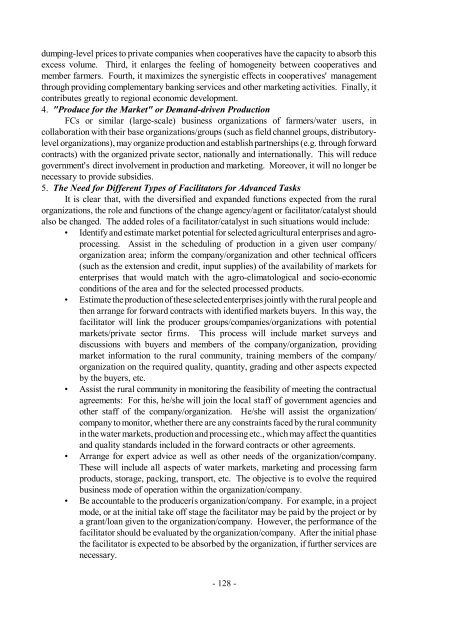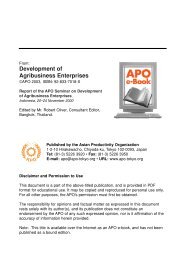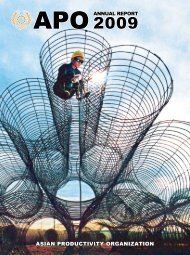Organizational Change for Participatory Irrigation Management
Organizational Change for Participatory Irrigation Management
Organizational Change for Participatory Irrigation Management
You also want an ePaper? Increase the reach of your titles
YUMPU automatically turns print PDFs into web optimized ePapers that Google loves.
dumping-level prices to private companies when cooperatives have the capacity to absorb this<br />
excess volume. Third, it enlarges the feeling of homogeneity between cooperatives and<br />
member farmers. Fourth, it maximizes the synergistic effects in cooperatives' management<br />
through providing complementary banking services and other marketing activities. Finally, it<br />
contributes greatly to regional economic development.<br />
4. "Produce <strong>for</strong> the Market" or Demand-driven Production<br />
FCs or similar (large-scale) business organizations of farmers/water users, in<br />
collaboration with their base organizations/groups (such as field channel groups, distributorylevel<br />
organizations), may organize production and establish partnerships (e.g. through <strong>for</strong>ward<br />
contracts) with the organized private sector, nationally and internationally. This will reduce<br />
government' s direct involvement in production and marketing. Moreover, it will no longer be<br />
necessary to provide subsidies.<br />
5. The Need <strong>for</strong> Different Types of Facilitators <strong>for</strong> Advanced Tasks<br />
It is clear that, with the diversified and expanded functions expected from the rural<br />
organizations, the role and functions of the change agency/agent or facilitator/catalyst should<br />
also be changed. The added roles of a facilitator/catalyst in such situations would include:<br />
Identify and estimate market potential <strong>for</strong> selected agricultural enterprises and agroprocessing.<br />
Assist in the scheduling of production in a given user company/<br />
organization area; in<strong>for</strong>m the company/organization and other technical officers<br />
(such as the extension and credit, input supplies) of the availability of markets <strong>for</strong><br />
enterprises that would match with the agro-climatological and socio-economic<br />
conditions of the area and <strong>for</strong> the selected processed products.<br />
Estimate the production of these selected enterprises jointly with the rural people and<br />
then arrange <strong>for</strong> <strong>for</strong>ward contracts with identified markets buyers. In this way, the<br />
facilitator will link the producer groups/companies/organizations with potential<br />
markets/private sector firms. This process will include market surveys and<br />
discussions with buyers and members of the company/organization, providing<br />
market in<strong>for</strong>mation to the rural community, training members of the company/<br />
organization on the required quality, quantity, grading and other aspects expected<br />
by the buyers, etc.<br />
Assist the rural community in monitoring the feasibility of meeting the contractual<br />
agreements: For this, he/she will join the local staff of government agencies and<br />
other staff of the company/organization. He/she will assist the organization/<br />
company to monitor, whether there are any constraints faced by the rural community<br />
in the water markets, production and processing etc., which may affect the quantities<br />
and quality standards included in the <strong>for</strong>ward contracts or other agreements.<br />
Arrange <strong>for</strong> expert advice as well as other needs of the organization/company.<br />
These will include all aspects of water markets, marketing and processing farm<br />
products, storage, packing, transport, etc. The objective is to evolve the required<br />
business mode of operation within the organization/company.<br />
Be accountable to the producerís organization/company. For example, in a project<br />
mode, or at the initial take off stage the facilitator may be paid by the project or by<br />
a grant/loan given to the organization/company. However, the per<strong>for</strong>mance of the<br />
facilitator should be evaluated by the organization/company. After the initial phase<br />
the facilitator is expected to be absorbed by the organization, if further services are<br />
necessary.<br />
- 128 -
















